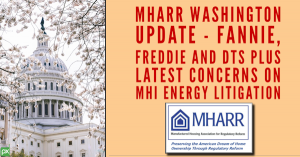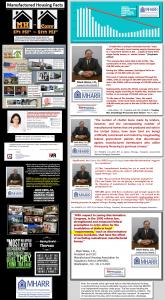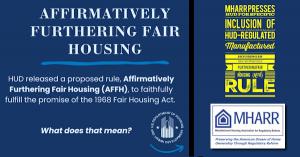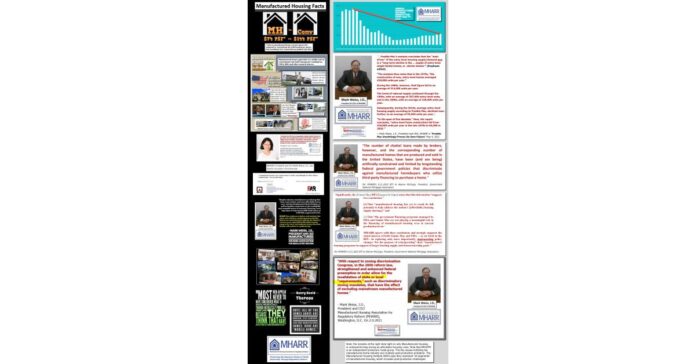
MHARR Washington Update – Fannie Mae, Freddie Mac and Duty to Serve (DTS) manufactured housing lending, plus Latest Concerns on Manufactured Housing Institute (MHI) DOE Energy Rule Litigation (Case No. 23-cv-00174).

Manufactured Housing Facts Provided by the Manufactured Housing Association for Regulatory Reform (MHARR) infographic is designed to debunk several common manufactured housing myths at a glance. The quotes on the right hand side of the graphic from Mark W

MHARR to HUD for Manufactured Homes In Affirmatively Furthering Fair Housing https://manufacturedhousingassociationregulatoryreform.org/mharr-presses-hud-for-specific-inclusion-of-hud-regulated-manufactured-housing-in-new-affirmatively-furthering-fair-housing-affh-rule/
Manufactured Housing Institute (MHI) v DOE suit (Case No. 23-cv-00174) update and meeting with MHARR leaders and FHFA Director Sandra Thompson on DTS
— Mark Weiss, J.D., President and CEO of MHARR.
WASHINGTON, D.C., UNITED STATES, June 26, 2023/EINPresswire.com/ — The Manufactured Housing Association for Regulatory Reform (MHARR) is a Washington D.C.-based national trade association representing the views and interests of producers of manufactured housing. The abreviated report and analysis that follows are from the complete article linked below.
MHARR Washington Update – Fannie, Freddie And DTS Plus Latest Concerns On MHI Energy Litigation
MHARR PRESSES DTS CHATTEL IN MEETING WITH FHFA DIRECTOR
In a June 20, 2023 meeting with Federal Housing Finance Agency (FHFA) Director Sandra Thompson, MHARR Washington officials once again pressed for immediate FHFA action to require Fannie Mae and Freddie Mac to fully comply with the statutory Duty to Serve (DTS) mandate by providing market-significant securitization and secondary market support for manufactured housing personal property (chattel) loans.
MHARR reminded the Director that nearly 80% of all new HUD Code homes sold today are financed as chattel and that chattel loans help lower and moderate-income families across the nation access the industry’s most affordable homes, thereby advancing housing equity. DTS support for chattel loans would draw more lenders into the manufactured housing market, providing more choices for borrowers, while greater competition and reduced risk would result in lower interest rates for consumers.
By contrast, in the absence of DTS chattel support – with not one manufactured home chattel loan purchased or securitized by Fannie Mae or Freddie Mac in the 15 years since the enactment of the statutory DTS mandate — manufactured housing consumers are needlessly forced to deal with industry-dominant lenders charging higher-than-necessary interest rates that have been previously characterized as “predatory.” This has been further compounded by HUD’s continuing failure to fully and properly implement and enforce the “enhanced federal preemption” provision of the 2000 Reform Law, which has allowed zoning discrimination and exclusion to persist against manufactured homes and manufactured housing consumers with devastating consequences for the industry and those consumers. Together, these two factors have kept millions of Americans out of the affordable manufactured housing market, while simultaneously limiting production and the growth potential of the entire industry as reflected by lower average manufactured housing production over the past decade-plus and the severe decline in manufactured housing production (now worse than -30%) over the last two quarters….
IS MHI BACKING AWAY FROM ENERGY LITIGATION?
In the belated court action filed by MHI (as urged by MHARR continually since May 2022) against the U.S. Department of Energy (DOE) with respect to DOE’s May 31, 2022 final manufactured housing energy standards rule, the parties have filed a “Joint Advisory” (copy attached) which asks the court to dismiss MHI’s Motion to Stay the DOE final rule and also indicates that the parties are “actively” engaged in ongoing “discussions” regarding the future course of that litigation.
While the dismissal, without prejudice, of MHI’s stay motion is not surprising in light of DOE’s extension of the compliance date for the May 31, 2022 final rule, pending the development of enforcement, testing and regulatory compliance regulations and, presumably, a new cost-benefit analysis, taking the added cost of those regulations into account, the industry should – and must – be wary of any type of agreed “course of action” that would either leave the May 31, 2022 rule in effect or otherwise concede or forfeit any of the industry’s arguments against the validity of that final standard….
The PDF of the MHI vs. DOE update of Case No. 23-cv-00174 is linked here. The full MHARR Washington, D.C. Update, report and analysis, is found at this link here.
Additional Related Information from MHARR
Department of Energy (DOE) Publishes ‘Unacceptable’ Manufactured Housing Energy Rule Extension is linked here.
Manufactured Housing Production and Shipment Data from MHARR
The largest known collection of manufactured housing industry production and top ten state shipment facts with years of publicly available monthly updates by any nonprofit group is found at this link below. Note: because there is widespread confusion on manufactured home industry terminology it is worth noting that there have been no mobile homes built in the U.S. since June 15, 1976.
https://manufacturedhousingassociationregulatoryreform.org/category/manufactured-home-shipments/
MHARR Issues and Perspectives
MHARR Issues and Perspectives are insider-insights and fact-packed articles authored by MHARR President and CEO, Mark Weiss, J.D. Years of “Issues and Perspectives” are found at the link below. They routinely provide information not found from other sources.
https://manufacturedhousingassociationregulatoryreform.org/category/mharr-issues-and-perspectives/
As the infographic shown with this press release indicates, key Issues holding manufactured housing industry at low ebb during an affordable housing crisis include the failure to fully and properly implement existing federal laws. The Manufactured Housing Improvement Act of 2000 and its ‘enhanced preemption’ provision is widely seen by industry professionals as not being properly enforced by the U.S. Department of Housing and Urban Development (HUD). Similarly, more cost-effective manufactured home lending has been provided for by acts of Congress that are apparently not being properly implemented.
Collection of MHProNews Q&As with Founding MHARR President and Current Senior Advisor Danny Ghorbani
Danny Ghorbani was a vice president for the Manufactured Housing Institute (MHI) before leaving and becoming the founding president and CEO of MHARR. Ghorbani’s 5 decade career was recognized by RV/MH Hall of Fame.
Latest Manufactured Housing Industry News from MHARR
The largest known collection online of manufactured housing industry focused news provided by a manufactured home industry nonprofit focused on independent producers’ facts and views are found at the link below.
https://manufacturedhousingassociationregulatoryreform.org/mharr-news/
Brief History and Objectives of the Manufactured Housing Association for Regulatory Reform (MHARR)
The Manufactured Housing Association for Regulatory Reform (MHARR) was established on July 3, 1985 as the “Association for Regulatory Reform” (ARR). The Association changed to its current name in the summer of 1997.
Brief History and Objectives of the Manufactured Housing Association for Regulatory Reform (MHARR)
Mark Weiss, J.D.
Manufactured Housing Association for Regulatory Reform
+ +1 202-783-4087
email us here
Visit us on social media:
Facebook
Twitter
LinkedIn
YouTube
Other
![]()









































